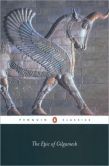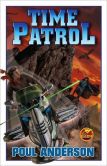Another
Column at MyShelf.Com
|
|||||||||
| Behind The
Fiction, Past |
|||||||||
| TIME TRAVEL IN FICTION An important question arises in the science fiction genre of "Time Travel"? Which way to go, into the future or back into the past?
If it's the past, than we must look to the Babylon work of "The Gilgamesh Epic", which is said to be the oldest series of legends and poems about the King Gilgamesh of Uruk dating back to 2000 B.C. Myth tells of him being part divine and part human. The stories are preserved on eleven clay tablets that essentially include many episodes that parallel the Bible. The Syrian author, Lucian Samosata was maybe the first to write about alien life forms. In his "True History" (160 A.D.) he attempts to debunk the ancient sources of the fantastic and mythical events as truths. In his literary criticism, he mentions the works of "Homer and Ctesias of Cnidus" and justifies his title "True History" by arguing that his is the only truthful mythological story ever written because in it he admits that it's all lies. Today there is a belief that the ancient wall carvings and crypto writings present strong elements of aliens visiting earth. According to the present day "Myth Breakers", the technologies used by our ancient ancestors to erect their cities were gifts from visiting aliens. If so, then, I query, "was the French Apothecary Michel de Nostredame an alien?"
"Time Travel" into the pass can create science fiction paradoxes, which may not be fiction; it could be today's science fact, or to be more precise, simply places where our own rational minds bump into its own limitations. Example: "The Grandfather Paradox", which is described as a person going back in time to kill his grandfather and if he kills his grandfather, he would never have been born, thus making it impossible for him to go back in time. Interesting? If it's the future, than it is about "Alternate Worlds" or "Parallel Universes". These are mostly about "Time Police". A good example is Poul Anderson's "Time Patrol" (2006), which brings hopes of a better future by protecting the future from fanatics, terrorists and dictators who would bring horror and mayhem into the future.
One great book about "Alternate Worlds" is "A Wrinkle in Time" (1962) by Madeleine L'Engle. This captivating story is a "Tesseract", which tells a tale of her searching through space to find her father. An excellent example of a "Parallel Universe" is Edwin Abbott's "Flatland" (1884) a novella, which describes a two-dimensional world that is occupied by geometric figures with a society rigidly divided by classes. Several movies have been made from his story. Better-known stories of "Time Travel" are:
Now, on the serious side, is "Time Travel" possible? Many professors in physics believe it's not possible because there would have to be some kind of constraint to prevent it. Then again, what if some day a person knocks at your door and says they're a distant relative? You're puzzled? You might want to think twice before you close the door. Because there is the quantum theory by Einstein!
----- Now, go softly into the night. mgf Comments always
welcome |
| 2013 Past Columns |
||||||||||
© MyShelf.Com. All Rights Reserved.

